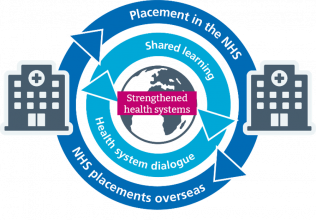You are here
Case Study: Global Health
Improving the Global Profile of the NHS through Partnerships
Our health and care workforce must adapt and change in order to provide the best possible health and care to the people of England in the face of ever-changing demand. HEE recognises that this can only be achieved sustainably and ethically by developing robust, knowledge-sharing, mutually beneficial partnerships with people, institutions, and governments across the globe.
Professor Ged Byrne MBE, Director of Global Health Partnerships, Consultant surgeon
Summary
The Directorate of Global Health Partnerships seeks to strengthen health systems and services in England through bilateral and multilateral, mutually beneficial, partnerships focused on workforce improvement.
Impact
1. Offer to NHS Staff - Education and Learning for the NHS Workforce
An offer to individual current and future NHS employees to provide professional development, career progression, and support life-long learning.
Global Learning Opportunities - Supporting and encouraging NHS staff to take advantage of volunteering opportunities within health and social care and working with senior operational leadership to increase recognition of the value of volunteering. We work with the Tropical Health and Education Trust to support local health partnership activity as well as Directly delivering global fellowship programmes..
Development of best-practice - Volunteering toolkits and developing best practice hub to support local programming such as the TALENT programme. TALENT brings early career nurses and midwives together with more senior nurse and midwife leaders into virtual communities to support professional leadership development.
2. Offer to NHS Systems – Educational Migratory Pathways into the NHS
An offer to the population of England and through mutually beneficial partnerships which benefit the NHS organisations and systems, improving quality & transparency of existing programmes.
Ethical Migratory Pathways - International recruitment system capacity and capability programmes for NHS providers. Including developing and piloting ethical, sustainable, education-based migratory pathways which have supported overseas educated health professionals where there is an over-supply of staff to join the NHS.
Managed Educational Partnerships - Bi-lateral educational exchange programmes with LMICs. This model of bilateral staff exchanges with overseas partners builds on education models with partnerships piloting ethical education pathways that meet local needs and increase global learning opportunities for NHS staff.
3. Offer to Global Partners - Global Health System Strengthening Global consultancy and knowledge exchange
An offer to the world to facilitate mutual health system strengthening for other health workforces using HEE’s expertise. Working with partners such as the Foreign, Commonwealth, and Development Office and the World Health Organisation these projects and programmes are externally funded.
Technical Collaboration and Consultancy - These Technical Collaboration partnerships run across a capability-building continuum focused on the health workforce. Following the success of the 2021/22 Year of the Health and Care Workers (YHCW) programme, Health Education England (HEE) and the World Health Organization (WHO) are partnering to deliver Working for Health 2030: Building Health Workforce Leadership. The programme aims to improve health outcomes for populations through interventions to strengthen the health workforce. Participants will build their own knowledge, skills, competencies and expertise for health workforce governance and planning.
NHS Consortium for Global Health (NHSC) - Provides a point of access to expertise from the UK’s national health organisations, including the major National Health Service ALBs. The NHSC’s unique selling point is the ability to provide a whole-system view, supported by access to expertise from across the NHS and UK health system. This perspective adds value to Government sponsored technical partnerships between countries. With oversight from the Department of Health & Social Care, the NHSC aligns with UK government strategy, delivering whole-system peer-to-peer technical exchange and global learning in order to strengthen health system governance and capabilities and foster sustainable collaborative partnerships.
Future direction
Global partnerships can help the NHS to improve the quality of care that it delivers to the population of England. They can provide solutions to deficiencies in the quantity and quality of healthcare professionals, strengthen our preparedness for future global healthcare threats such as pandemics and allow our healthcare workforce to adapt quickly to changes in the demands of our patients such as the rise in non-communicable disease, an ageing population, and the threats to our health from climate change.
